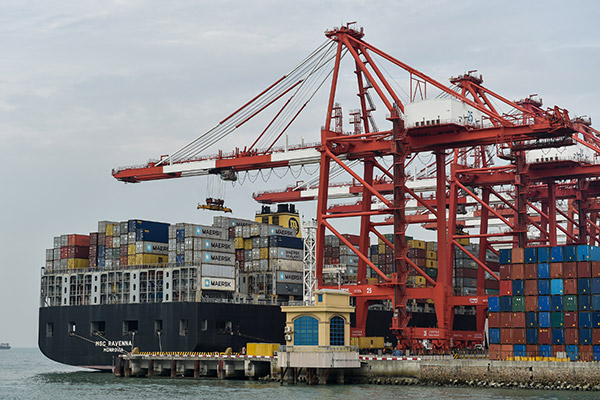Shenzhen to pursue B&R opportunities
Major companies in Shenzhen are expanding to cope with growth opportunities thrown up from the Belt and Road Initiative.
|
Shenzhen Shekou Port handled nearly 24 million TEUs of containers in 2016, making it one of the three largest global cargo-handling seaports. [Photo/China Daily] |
International projects are opening up for businesses in industries such as infrastructure, logistics, information technology and financial services.
"To reap the benefits from its harbor location, Shenzhen is boosting connectivity with countries and regions related to the Belt and Road Initiative by implementing projects in trade, logistics, air transport and the information sector," said Wu Sikang, director of the Shenzhen Development Research Center.
Shenzhen is one of China's most vibrant cities and is actively encouraging Chinese companies to develop a Going Global strategy.
Already many firms are involved in putting together logistic networks, Wu confirmed.
Shenzhen Yantian Port Group Co Ltd has signed a memorandum of understanding to take part in the Melaka Gateway Port project in Malaysia.
China Merchants Group has also announced plans to roll out offices in 47 ports in 18 countries.
Local enterprise groups continue to be in the forefront of the Belt and Road Initiative, which connects Asia, Africa and Europe to a modern version of the ancient Silk Road.
Shenzhen airport has invested heavily in infrastructure renovation and launched new flights. It has added 12 international routes, including to Sydney, Dubai and Jakarta.
It has also increased the number of flights to major Southeast Asia cities. Last year, about 2.23 million international travelers visited the airport, which was up one third year-on-year.
Other sectors are also experiencing a boom.
"To serve the city's crossborder financial and logistics business, Shenzhen is working full swing on its booming IT sector," Wu said.
"It has increased the speed levels of its internet connection with Qianhai, the pilot zone for service industry cooperation. And it will also build a cross-border e-commerce customs clearance platform," he added.
Wu pointed out that stimulating cross-border trade was crucial to the economy.
Last year, 216 foreign companies started up in Shenzhen, an increase of 46.9 percent year-on-year. The city's international trade with Belt and Road economies also reached 482.7 billion yuan ($70.9 billion) during the same period, an increase of 7 percent compared to 2015.
"Cross-border trade has become a vital growth engine for the city's economy," Wu said. "The city has seen an increase in import and export activity, and bilateral investment since last year."
In 2016, Shenzhen attracted $280 million of foreign investment, a jump of 175 percent compared to the previous year.
Domestic companies such as Huawei Technologies Co Ltd and ZTE Corp are also scrambling to expand their global presence.
Huawei, the multinational telecommunications equipment and smartphone manufacturer, has invested $12.5 billion in Belt and Road-related economies.
Now its products and services are available in more than 170 countries and regions.
ZTE, another multinational telecommunications equipment company, has moved into overseas markets. It recently bought a major share in a leading Turkish telecoms company Netas for $101.3 million.
Shenzhen Energy Group has pursued opportunities in Europe and is involved in a wind power project in Greece.
Closer to home, Wu stressed that Shenzhen would accelerate cross-border financial collaboration through the Qianhai pilot zone.
China Merchants Bank has provided a 341 billion yuan fund for 1,186 clients involved in the initiative, which includes cross-border renminbi loans, bilateral bonds and equity investments.
The city has also set up a 10 billion yuan pool to support overseas acquisitions and infrastructure projects.
Cultural companies are also promoting the Going Global development strategy.
Shenzhen Broad Link Cultural & Creative Co Ltd has held exhibitions in Pakistan, Canada and the United States.
"We want to use cutting edge digital technologies to re-create Chinese culture and expand its influence in the world," said Joe Ye, managing director of Shenzhen Broad Link.
